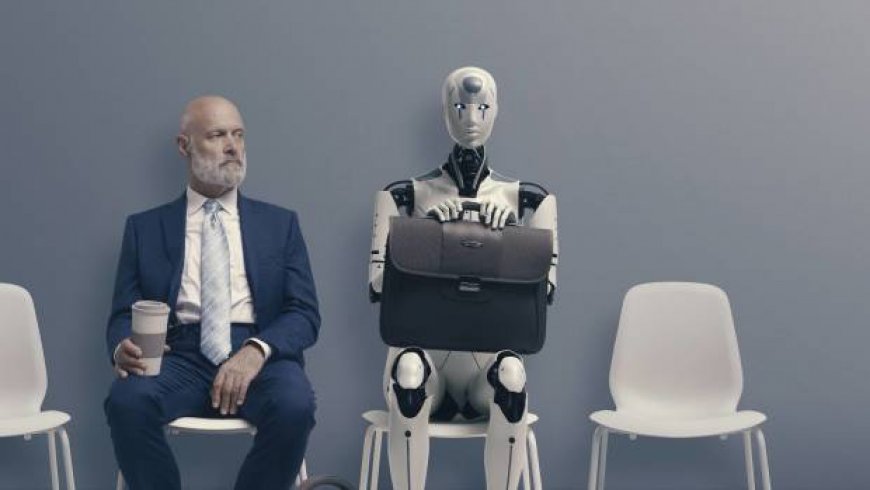US Expert Warns of One Overlooked AI Risk
It's not the extinction risk.

Since ChatGPT helped it rise to prominence late last year, the conversation around artificial intelligence has blossomed into an endless debate. Some experts have warned repeatedly of the existential risk posed by AI models, suggesting that this is a world-ending technology.
Others have said that AI is not likely to become quite that powerful, but even in its current state, the tech is already causing a litany of harms as it moves to threaten democracy and empower criminals and bad actors.
DON'T MISS: Artificial Intelligence Isn't Going to Kill Everyone (At Least Not Right Away)
Still others have said that, at this stage, it is simply too early to predict where AI will lead us, how quickly it will do so and how much damage it may or may not cause on the way.
One thing most experts and Big Tech companies seem to agree on, however, is the impact AI will have on jobs. An oft-overlooked component of the pending economic transformation that AI will bring, according to one expert, is "more inequality than ever."
"If we take a look at the Industrial Revolution, we displaced hundreds of thousands of workers. Software displaced millions of workers, people just don't realize that," Dr. Srinivas Mukkamala, an AI authority who now serves as Ivanti's CPO, told The Street. "And then with AI, that number is going to be exponentially larger than what software did."
Mukkamala said that, though AI will certainly bring enormous boosts to every country's GDP, it will further broaden the gap between skilled and unskilled workers and countries, creating "so much inequality that no politician can address it."
Regulation, Mukkamala said, ought to go beyond the government providing guidelines for how companies can use AI. It should additionally serve to answer questions surrounding the accessibility and equality of the technology.
And though he has other areas of concern -- including bias and transparency -- this is his most significant AI red flag.
"The only thing I'm concerned with is the haves and the have-nots. This is going to create inequality that we've never seen in our lifetimes," Mukkamala said. "We're going to pretty much have 99% of the world's population left behind. There is just no doubt about it. We're going to create a true economic crater."
AI Bias and Hallucination
AI biases and hallucinations are another major area of concern for Mukkamala, who said that software defects within AI models could potentially impact millions of people.
He likened it to the manner in which the pharmaceutical industry is regulated.
More Artificial Intelligence:
- Why ChatGPT Can't Turn Into Marvel Villain Ultron (Yet)
- Human Extinction From AI is Possible, Developers Warn
- Here's the Steep, Invisible Cost Of Using AI Models Like ChatGPT
"Will we ever approve a drug without knowing who invented it? What were the clinical trials? Who conducted it? Who certified it? We will never do that," Mukkamala said. "Why not with AI?"
There is simply too much about AI -- variables, internal weights, accuracy, training -- that is not known about these models. The answer to these questions necessitates full transparency from the companies creating them, something that, at odds with its name, OpenAI has been reluctant to give.
Despite this need for regulation, Mukkamala said the EU's AI Act is too restrictive; a balance needs to be found, and found quickly, between properly regulating these models and curtailing innovation. The danger of a nation getting left behind in the race to build more powerful AI is, for Mukkamala, extreme.
ChatGPT's Impact on the Speed of AI Adoption
AI, both as a field studied by computer scientists and as a consumer-facing technology, is nothing new. Machine learning has been around since the 1950s.
In 1970, Marvin Minsky, an American computer scientist, told Life Magazine that in "three to eight years we will have a machine with the general intelligence of an average human being.”
But when OpenAI launched ChatGPT, according to Mukkamala, Sam Altman's company cut a 12-year journey of gradual, responsible AI adoption down to a couple of weeks, leaving consumers, corporations and tech giants scrambling to adopt technology that isn't really ready yet.
"With ChatGPT, the dam broke. Right now, we have no choice. We have to scramble, and fast.," he said. "If I had a kill switch, I would press it. Unfortunately, I think that kill switch is broken."
The New Age of Extreme Wealth
Despite the hype that was built up around AI, Mukkamala said that those few scientists who have actually studied AI are very clear on one important point: "AI is as good as your data."
And while this tech will certainly enhance the abilities of bad actors, Mukkamala's main point was a simple one: the next sect of the world's richest people will get there through AI.
"Who were the world's richest 10 years ago? All the oil companies. Who are the richest now? People with data. Who are the next richest? People with AI," he said. "If you are AI-centric, you are going to rule the world, you're going to be the world's richest."
And though he doesn't believe that AI will be responsible for destroying humanity, Mukkamala did say that there is truth to the possibility of AI becoming a destructive weapon, something that has been echoed by other experts including Dr. Gary Marcus.
"As long as you have the data that can cause harm, absolutely, the bad guys are going to do that," he said. "A cyber attack which takes 40 days to launch today can be launched within two seconds using AI. It's going to advance the enemy's capability."
What's Your Reaction?



























































